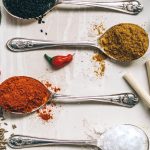The fall season is upon us and we are encouraged to celebrate the harvest and other blessings of the past year through a tradition called Thanksgiving. And while not everyone celebrates Thanksgiving, many of us can appreciate a large meal with friends and family. From an Ayurvedic perspective, let’s look at food combining and how it plays a role in your overall health and the different ways we socialize depending on each individual dosha.
Food Combining
Each Ayurvedic dosha is comprised of two elements from which we are created: vata dosha (air and space), pitta dosha (fire and water), and kapha dosha (earth and water). Most of us will have one dominant dosha, some will have two or more, and all of us will have some of each.
Depending on your dosha and season, there are optimal food choices which you can select to create balance in your mind and body. The below chart, however, can be used by all of the doshas.
| Foods | Compatible | Incompatible |
| Beans | Grains, vegetables, other beans, nuts, seeds | Fruit, milk, cheese, yogurt, eggs, meat, fish |
| Butter & Ghee | Grains, vegetables, beans, nuts, seeds, meat, fish, eggs, cooked fruit | Ghee combines better than butter with most food because it’s cooked longer |
| Cheese | Grains, vegetables | Fruit, beans, eggs, milk, yogurt, hot drinks |
| Milk | Best alone. Exceptions: rice pudding, oatmeal, dates, almonds | Any other food (especially bananas, cherries, melons, sour fruits, yeasted bread, eggs, yogurt, meat, fish, kitchari, starches) |
| Yogurt | Grains, vegetables | Fruit, beans, milk, cheese, eggs, meat, fish, nightshades, hot drinks |
| Eggs | Grains, non-starchy vegetables | Milk, cheese, yogurt, fruit (especially melons), beans, kitchari, potatoes, meat, fish |
| Fruit | Other fruits with similar qualities, (i.e. citrus together, apples and pears, a berry medley) | Any other food (aside from other fruit) except dates with milk, and some cooked combinations |
| Lemons | Usually okay with other foods if used in small amounts | Cucumbers, tomatoes, milk, yogurt. Note: lime can be substituted for use with cucumbers and tomatoes |
| Melons | Best to have each type of melon alone | Everything (especially dairy, eggs, fried food, grains, starches |
| Grains | Beans, vegetables, other grains, eggs, meat, fish, nuts, seeds, cheese, yogurt | Fruit |
| Vegetables | Grains, beans, other vegetables, cheese, yogurt, meat, fish, nuts, seeds, eggs | Fruit, milk |
| Nightshades (peppers, eggplant, potatoes, tomatoes) | Other vegetables, grains, beans, meat, fish, nuts, seeds | Fruit (especially melon), cucumber, milk, cheese, yogurt |
| Hot drinks | Most foods, unless the hot drink contains other foods (i.e. milk, fruit) in which case reference that particular food | Mangoes, cheese, yogurt, meat, fish, starches |
| Leftovers | Ideally, just other leftovers from the same meal. Preferably not more than 24 hours old. | Freshly cooked foods |
| Raw foods | Other raw foods | Cooked foods (especially in large quantities) |
Some of the incompatible foods may seem obvious, like fish and milk but others such as fruit and yogurt might be a daily staple. As mentioned in the chart, fruit, aside from dates and some cooked combinations are best eaten alone or with other fruits of the same qualities. This has to do with the way the body breaks down the food. Yogurt has heavy qualities whereas fruit has light qualities, each are digested at different rates. Thus, when combined, your body will go out of balance and you may experience signs of indigestion such as early fullness during your meal, uncomfortable fullness after your meal, burning, bloating, or nausea. In addition, toxins are able to thrive in this type of environment and over time, can lead to disease.
Ayurveda is meant to be intuitive and so is proper food combining. However, if your intuition has been overridden by your current diet and lifestyle, it may take time to get into a different rhythm, one more in line with your true nature. And so, start small. Perhaps there’s something on the food chart that stands out to you, something that you have on a regular basis. If so, begin there. Otherwise, consider printing the chart and putting it on your refrigerator; let it subconsciously sink in and take a glance at it before you prepare a meal or grab a snack.
Socializing
When it comes to socializing, your dosha can be an indicator of how you work a room. It can show you where you thrive and also let you know when you need more balance. For example, if you identify mostly with vata dosha, you may be the person at the dinner party who has multiple, light-hearted conversations. Your friends, family, and people you’ve just met feel energized by you and you tend to light up the room with your spontaneous, creative ideas.
If you resonate mostly with vata, when you’re out of balance you may feel overwhelmed at a dinner party. The lights and noises may be overstimulating and you might feel anxious, scattered, and want to retreat. At the end of the evening, you may feel drained and you’ll likely not sleep well due to the ungrounded energy running through your mind and body.
To help balance vata, enjoy food and beverages that are cooked/warm, rather than raw/cold. For example, avoid raw salad and have room temperature or warm water. If you eat meat, the dark meat will have more benefits for vata because it’s oily and therefore, grounding. If you don’t eat meat, a grounding source of protein is tofu, however, it’s wise to have it in moderation because it can be challenging to digest. If you drink alcohol, have beer and wine in moderation and lastly, find pockets of time where you can reset and connect to your breath, even if just for a minute.
If you identify mostly with pitta dosha you’re a natural leader who inspires people with your sharp mind and powerful ideas. You will most likely be the host of the dinner party and/or you’ll be the one who gives the toast. You may notice if there’s any chaos in the room and you’ll be the one that takes action to create order. If dinner isn’t on time, you may become agitated because you have a strong digestive fire.
When pitta is out of balance, you may cut someone off or show a lack of interest during a conversation. You may also be attached to your personal beliefs and perspectives, so much so that conversations can turn into heated arguments, especially if you’re speaking to another pitta! You also have a tendency to want to control things – this could be situations, outcomes, and other people; by the end of the evening, you may feel like things could have gone better.
To help balance fiery pitta you could favor cool food and beverages. For example, foods like raw salad are naturally cooling and you could have cool (not cold) water. If you eat meat, the white meat is the most beneficial for you because it has dry qualities which will help balance pitta’s oily tendencies. If you don’t eat meat, tofu and tempeh are good options. If you drink alcohol it’s ideal to have beer in moderation and avoid hard alcohol and wine. Before going to the dinner party, consider meditating – this will cool your thoughts and create space and compassion for yourself and others.
If you’re predominantly kapha in nature it’s less about working the room than it is finding a cozy spot or person to connect with. If the dinner is a potluck, that’s where you’ll shine because you enjoy nurturing activities like cooking! You love helping so you’ll likely be the one to make sure everyone’s drink is full and you’ll joyfully help clean up after dinner. You’ll feel full of love and gratitude to be with your friends and family. If the gathering becomes a little rowdy, you can be the calm, grounding force that’s needed to decrease the overcharged energy.
If you’re out of balance, you may not feel like going to the dinner party. If you’re partnered with someone and they want to go to the party, you may have a sense of attachment to them and you could find yourself hurt or upset that they would go without you. If you do go to the party, you might not feel like socializing and because you’re stubborn, it could be difficult to change your mood. When it’s time to eat dinner, you may overeat as a way to comfort yourself. The next morning, and in general, if you’re out of balance, you may find it difficult to get out of bed.
To balance kapha dosha, light, warm, and dry foods will be the most beneficial for you. This could be a warm, cooked salad and room temperature or warm water. In addition, avoiding dense foods like pumpkin pie is wise. If you eat meat, the white meat will be the most beneficial for you because it’s dry rather than oily. If you don’t eat meat, hot tofu (not cold) and tempeh work well. If you drink alcohol, have dry wine (red or white) in moderation and avoid beer, hard alcohol, and sweet wine. Before and after the party, go for a brisk walk to enliven your senses and help aid digestion.
Overall, each person is going to have a different experience. It’s up to you to create your experience and to have compassion for others while they navigate theirs. With the help of Ayurveda, you can make conscious choices to improve your overall health and maintain balance in otherwise all-consuming experiences, like dinner parties.
All material provided in this article is for informational purposes only. Direct consultation of a qualified Ayurvedic Health Counselor should be sought for any specific questions or issues.
Chart provided by Banyan Botanicals: https://www.banyanbotanicals.com/info/ayurvedic-living/living-ayurveda/diet/ayurvedic-food-combining/













